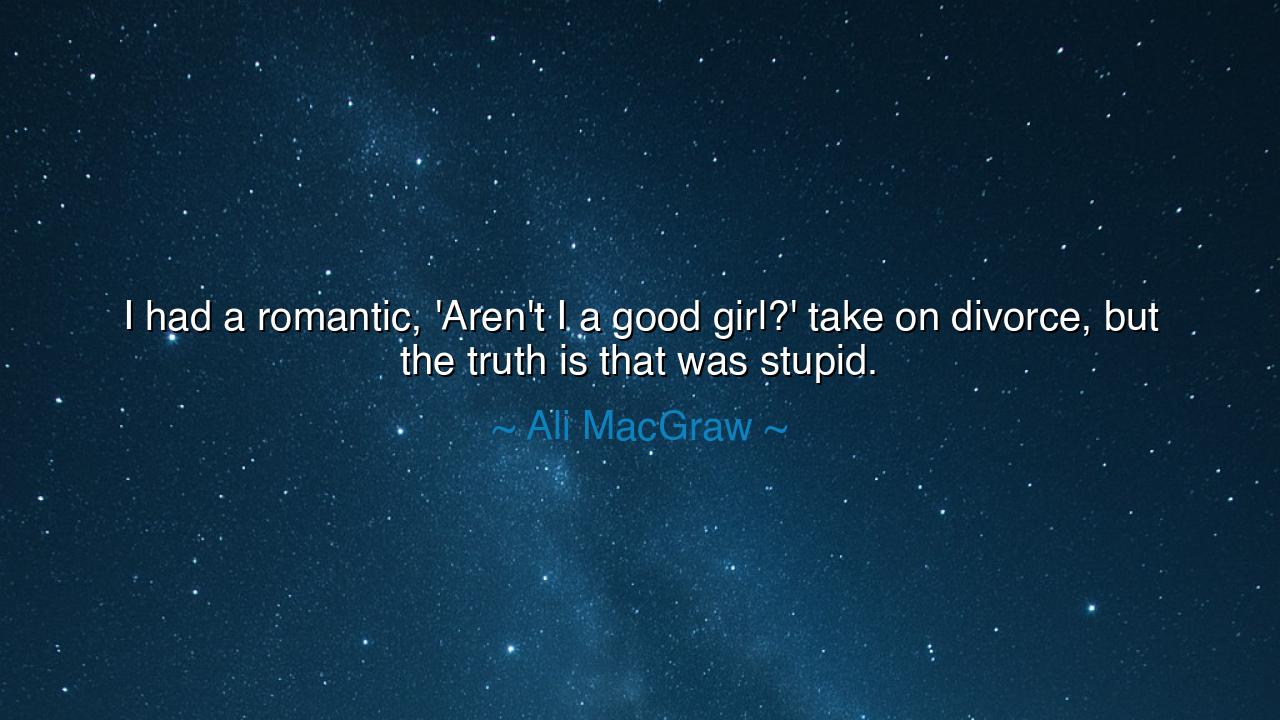
I had a romantic, 'Aren't I a good girl?' take on divorce, but
I had a romantic, 'Aren't I a good girl?' take on divorce, but the truth is that was stupid.






"I had a romantic, 'Aren't I a good girl?' take on divorce, but the truth is that was stupid." With these candid words, Ali MacGraw reflects on the evolution of her thinking about divorce—an institution that is often clouded by romantic ideals and societal expectations. In her early years, MacGraw embraced a naive perspective on divorce, one that may have been shaped by the idealized vision of relationships she saw in movies, books, or the world around her. Divorce, in her view, may have seemed like something that only happened to people who were not good or strong enough to maintain their commitments. However, over time, as she experienced divorce firsthand, she realized that this romanticized notion was not just overly simplistic, but unrealistic. Divorce, as she discovered, is rarely a black-and-white issue but is often a complex and painful process that requires courage, self-awareness, and acceptance of imperfection.
In the ancient world, divorce was rarely seen through a romantic lens. Greek and Roman societies, though largely patriarchal, had a more pragmatic approach to marriage and relationships. Marriage was seen as an institution for the maintenance of social order and the preservation of lineage, not as a sacred bond of eternal love. For example, Cicero, the Roman philosopher, married for social advancement and personal convenience rather than for love, and divorce was a common recourse when marriages were no longer serving the intended purpose. However, divorce was not seen as romantic; rather, it was often the result of practical and strategic decisions. The notion of an emotionally-driven, romanticized view of divorce would have seemed foreign to the ancients, who saw relationships through a more realistic and functional lens.
Contrast this with the ideals that emerged during the medieval period, where courtly love began to gain prominence. In these romanticized stories, love was seen as the ultimate pursuit, and marriage was often viewed as the highest expression of this ideal. Yet, in the real world, many medieval marriages were political or social arrangements. The idea that divorce was a failure in the pursuit of romantic love was born from the same romantic ideals that MacGraw mentions—an ideal that only later would be tested by the harshness of reality. Much like MacGraw, many would come to see that the romanticized views of love and marriage, however appealing, often collided with the practical challenges of life.
In modern times, Hollywood has greatly contributed to this romanticized vision of love and divorce. MacGraw, as an actress known for her role in the iconic film Love Story, may have initially been influenced by the same glamorous, idealistic depictions of love that her audiences consumed. Love and marriage in such films were often portrayed as ultimate achievements, and divorce was seen as a tragic failure of the perfect relationship. The influence of this idealistic portrayal of romantic love made MacGraw’s earlier perception of divorce seem almost innocent in its simplicity. However, through life’s own lessons, she came to see divorce as an emotional and complex process, not a sign of failure, but sometimes an opportunity for growth and self-discovery.
The lesson that MacGraw imparts is one of self-awareness and honesty. She admits that her earlier perspective on divorce—one that viewed it through a lens of moral judgment and romantic ideals—was naïve. In reality, divorce is often a difficult decision that involves not just personal sorrow, but a revaluation of one’s life and relationships. It is an act that requires deep courage—to acknowledge imperfection, to face the reality that sometimes relationships no longer serve the individuals involved, and to move forward with dignity and clarity. Like the ancients, who understood marriage and divorce as practical and personal decisions, we must embrace a more mature view of relationships—one that acknowledges the complexity of human emotions and the ever-changing nature of life.
In our own lives, we must resist the temptation to view relationships and divorce through the lens of romanticism. The world often paints a simplified picture of what love, commitment, and marriage should be, yet the truth is that each relationship is unique, filled with both joy and struggles. Divorce should not be seen as a moral failure, but rather as a recognition that relationships, like people, may grow apart or evolve in ways that require change. MacGraw's words urge us to look beyond the surface of romantic ideals and embrace the complexity of our own emotional experiences.
Let us, then, approach our relationships with a spirit of maturity, understanding, and honesty. When the time comes to make difficult decisions—whether in relationships, careers, or life paths—let us be guided not by romanticized ideals, but by a deeper awareness of our own needs and the needs of those around us. Just as MacGraw learned that her earlier view of divorce was naïve, we too must recognize that the most profound growth often comes from facing the difficult truths and taking bold, courageous steps toward personal evolution.






AAdministratorAdministrator
Welcome, honored guests. Please leave a comment, we will respond soon